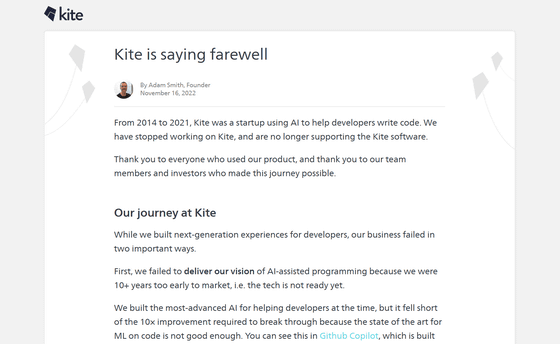Startup `` Kite '' that supported developer's code creation by making full use of AI closed, open sourced all the code so far and released it to GitHub

Startup Kite, which develops a programming support tool `` Kite '' that uses AI to complement Python code, has stopped developing the tool and ended support. In addition, Kite has open sourced all the code it has developed so far and published it on GitHub.
Kite is saying farewell - Code Faster with Kite

Kite GitHub
https://github.com/kiteco
I'm bummed that Kite isn't continuing. It's the time for these tools, and we are already seeing value… and it's growing daily.
— Dion Almaer (@dalmaer) November 20, 2022
Very generous for them to open source everything.
???????????? This is a treasure trove! https://t.co/y60fQ8RUlW
``We built a next-generation experience for developers, but the business failed at two key points,'' said Adam Smith, founder of Kite.
One of them was that it was more than 10 years too early for programming assistance by AI to enter the market, and the technology was not yet finished. Kite developed a tool to support programming with Python with AI, but it seems that machine learning was not sufficiently performed and it could not be improved enough to solve the problem. Kite says, ``As you can see from GitHub Copilot, which GitHub is building with OpenAI, it shows a lot of potential, but there is still a long way to go.''
The biggest problem is 'the state-of-the-art model didn't understand the structure of the code,' Smith said. Of course, it seems that the recognition accuracy of the code structure has been improved by repeated improvements, but it may cost more than 100 million dollars (about 14 billion yen) to completely solve it.

And Mr. Smith says that another reason why the business failed was that they couldn't monetize their product.
Kite developed its business in the order of 'development team formation', 'product development', 'distribution arrangement' and 'monetization'. The development team was formed by world-class engineers, but product development was in 2019, five years after Kite's start-up.
After that, when the tool was released, monthly active users reached 500,000. Marketing costs were almost zero, and 'distribution arrangements' were also executed very well. However, even after gaining 500,000 active users, he was still unable to make money from the tool. ``Half a million developers wouldn't pay to use our tools,'' Smith said. Even if the time to write code was reduced by 18%, we could not get enough sympathy.'
In order to solve this problem, Kite said that he considered a new direction called code search. However, Kite, who has already been in business for seven years, seems to have given up because he no longer has the physical strength to pursue the code search function due to daily hard work and burden.
Addressing investors who have backed Kite so far, Smith said, 'It's a shame it didn't work out. We're betting on the chance that we can dramatically accelerate the speed of software development in the world. However, despite everyone's efforts, the attempt did not go well.I think it is important to learn from mistakes and take responsibility, but I don't think I will regret it. It's all too easy to overrule past judgments with hindsight, and given how little we knew when we started Kite in 2014, it's a good idea for us to take the risk. We can only look back with courage, with love, and it is with that kind of courage that we live in a world of rapid progress.'
In addition, we would like to thank our users for their enthusiastic acceptance of new ideas, including Kite. Your enthusiasm drives our efforts, and your feedback directs our efforts. It's been a pleasure working with you through countless emails, GitHub posts, and live conversations. It's a very sincere passion, and this passion is one of the things that's been missing most from our work.'
Related Posts:
in Software, Posted by log1i_yk







